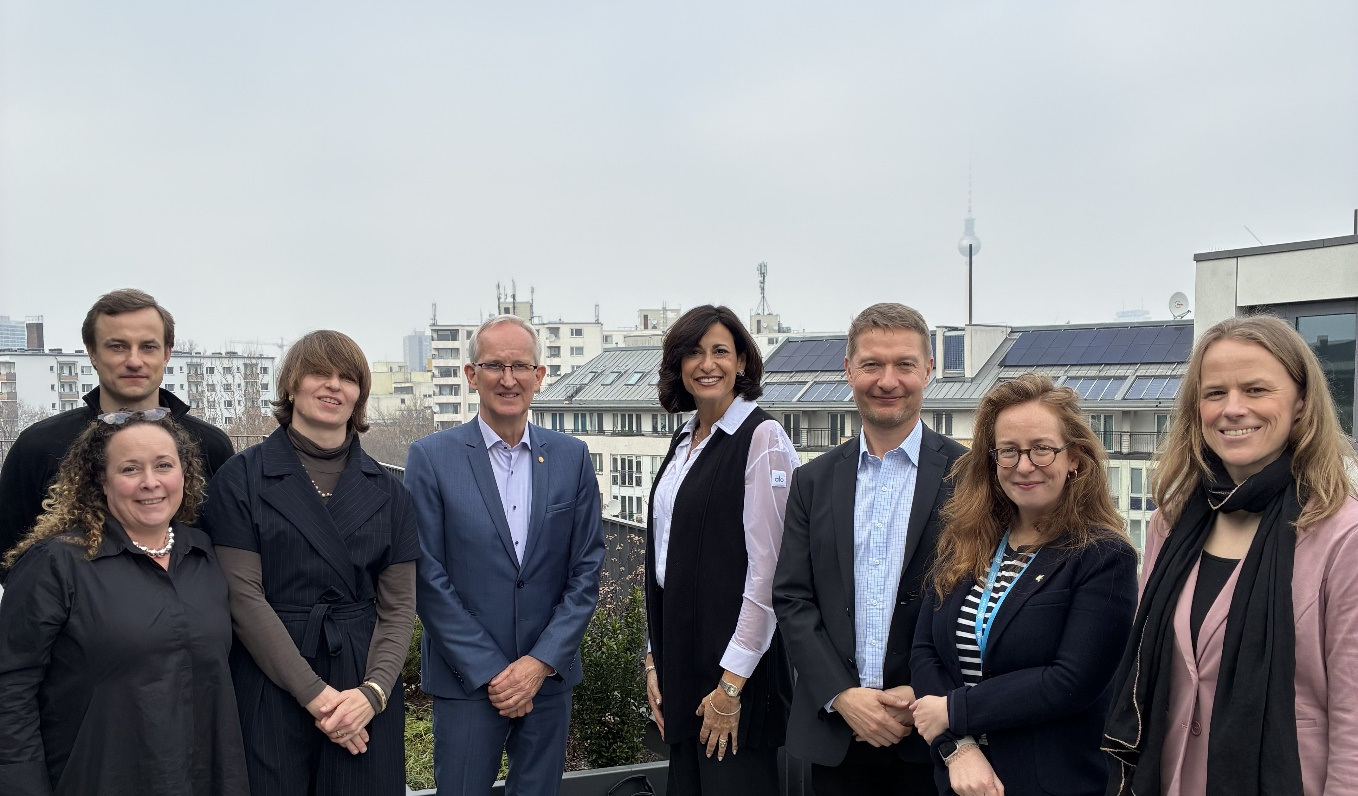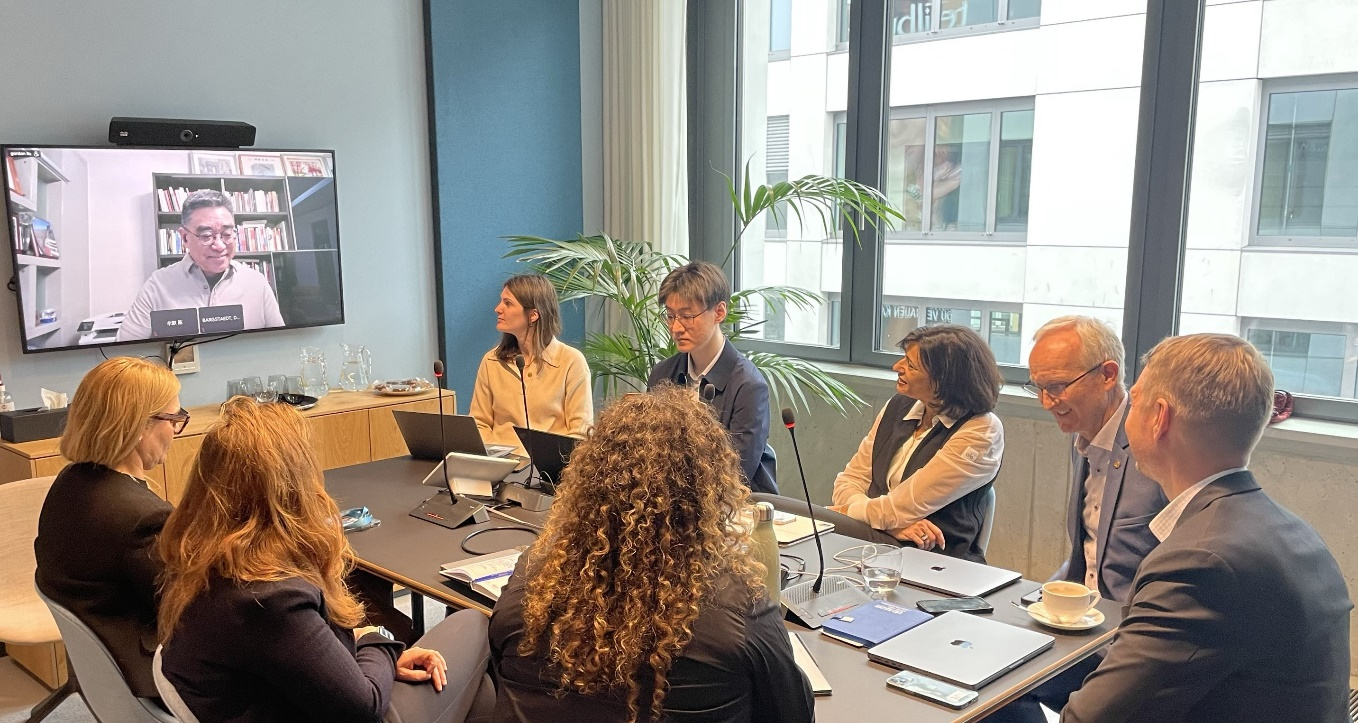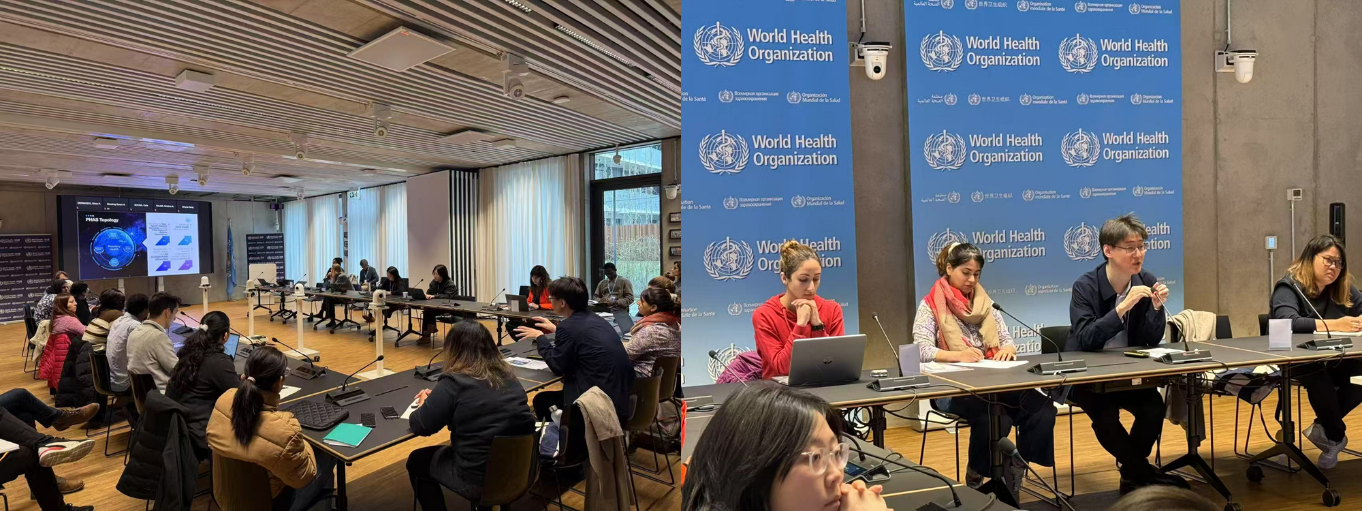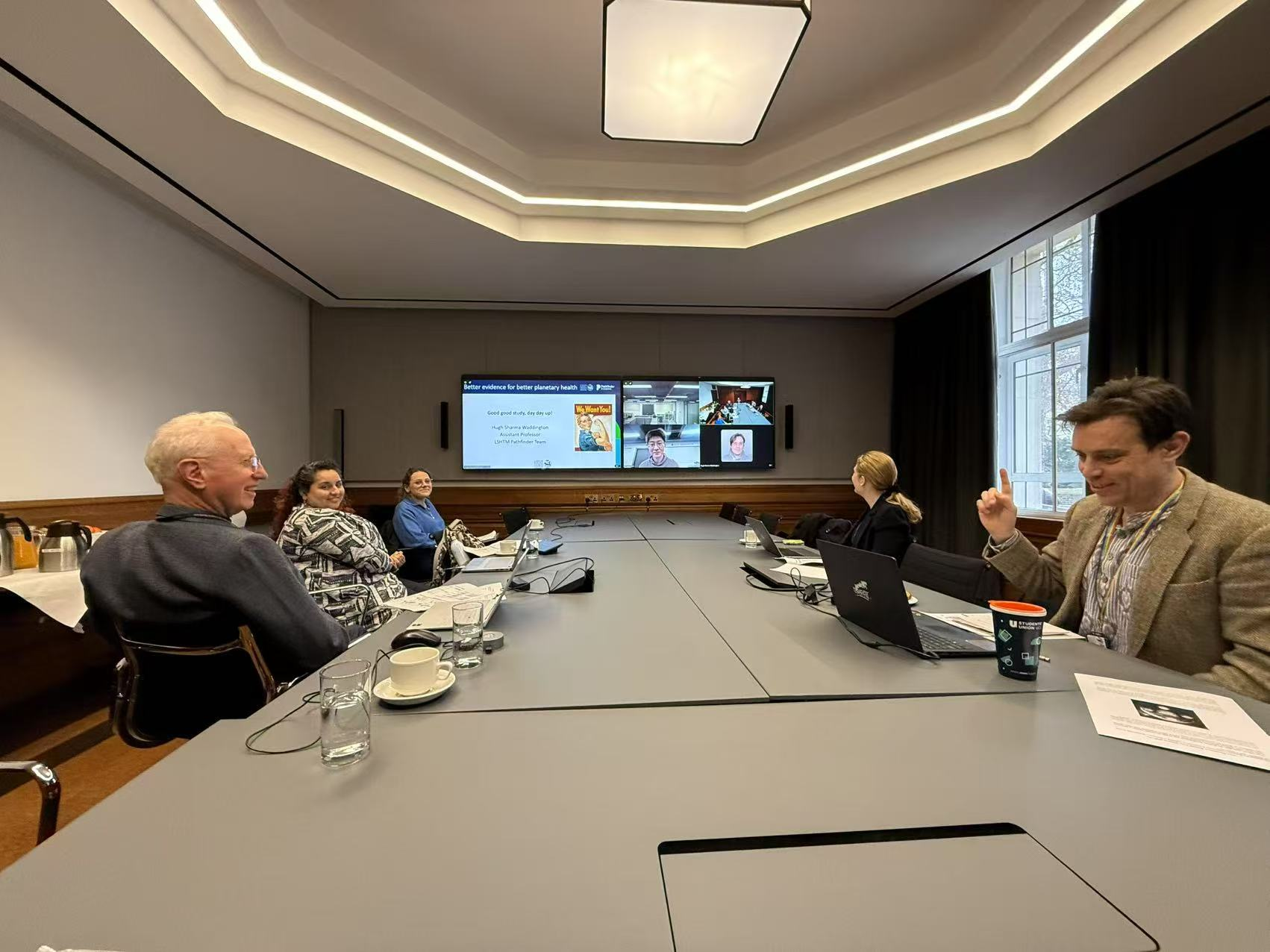From 9 to 14 March 2025, Dr Bernhard Schwartländer and Dr Ermo Chen travelled to Berlin, Germany, and London, UK, to meet with leading institutions in Planetary Health. The objective of the travel was to present progress in PHAS development and explore areas for collaboration.
Gordon G. Liu, Project Director of PHAS, Dean of Peking University's Institute for Global Health Development, attended the meeting online and delivered a presentation on the PHAS project. Dr. Bernhard, Senior Research Professor at the Institute for Global Health Development and former Assistant Director-General of WHO, introduced the purpose, significance, and vision of PHAS to participating institutions. Dr. Ermo Chen, Chief Scientist of the project, demonstrated PHAS's principles, methodologies, key technologies, and sample outputs through a presentation. All participating institutions expressed their recognition of PHAS's work and progress, while placing high expectations on its potential contributions to addressing critical issues in planetary health. The institutions indicated varying degrees of willingness to collaborate, expressing anticipation for further exchanges and deeper collaboration with the PHAS project team. Concurrently, Professor Bernhard visited the Department of Social, Health, Environmental, and Labor Affairs at the German Federal Chancellery (BKA) and the Wellcome Trust to discuss relevant matters.
Meetings were held with
1. The World Health Summit, Berlin
Prof. Axel Pries, WHS President;
Carsten Schicker, WHS CEO;
Julian Kickbusch, WHS Senior Programme Director
2. The WHO Hub for Pandemic Preparedness, Berlin
Dr. Oliver Morgan, Director of the Hub;
Sara Hersey, Director of Collaborative Surveillance;
Katie Smallwood, Unit Manager of Epidemic Intelligence Networks;
Philip Abdelmalak, Unit Manager of Intelligence, Innovation & Integration;
Julia Fitzner, Director of Data Analytics;
John Anthoney, AI Developer, ADAAPT
3. Potsdam Institute for Climate Change
Prof. Johan Rockström, Director of PIK;
Hermann Lotze-Campen, Head of Climate Resilience Research Department;
Dr. Amanda Wendt, head of Climate Research and Health;
Dr. Benjamin Bodirsky, Senior Scientist Climate Impact (simulations, land and food systems);
Dr. Lisa Poertner (MD), guest researcher (Climate change, nutrition and health)
4. London School of Hygiene and Tropical Medicine
Prof. Andy Haines, former Director of LSHTM;
Prof. Hugh Sharma Waddington (Pathfinder, climate and health co-benefits);
Mia Kett, Senior Policy Adviser Royal Society (healh and climate change);
Blanca Anton, Research Fellow (Pathfinder);
Sunita Malhi
Meeting at WHS

The annual World Health Summit is the leading platform for a global dialogue on Health. Planetary Health and digital innovation will be core priorities of this year’s Summit in October 2025. WHS showed great interest in the work of PHAS, after having included first international presentation of PHAS at its Summit in 2024. WHS very much understands the innovative approach, opportunities and challenges of PHAS as a big data and AI driven analytical tool.
WHS offered in principle a keynote presentation of PHAS during the Summit in 2025, as well as the opportunity for an invite side event to discuss progress and next steps with key experts and institutions. This may be an important opportunity to establish the international advisory board to PHAS. In addition, the proposal was made to design a full day meeting attached to WHS 2025 to have a deep dive international seminar to further analyze the opportunities and challenges of PHAS as an innovative tool, with the principal objective to better understand synergies between conventional analysis and AI driven big data approaches towards providing a real tool for decision makers.
Meeting with WHO Hub


WHO, in in particular the Hub in Berlin on Pandemic, have been leaders in big data and AI approaches in pandemic and integrated surveillance. The PHAS presentation was well received, and there were excellent discussions on common challenges and opportunities. The Hub is interested in further exchange and collaborations to build on each other’s experience.
During the discussions, the opportunity was also explored for a fellowship exchange with PHAS experts spending time with the technical teams at the Hub to deepen the exchange of experience.

In addition, at the invitation of the WHO Hub, Dr. Ermo Chen gave a one-hour presentation on the PHAS project to international students worldwide, demonstrating the concept, methods, key technologies and output examples of PHAS. International students and teachers from Charité participated in the presentation on site.
Meeting with Potsdam Institute for Climate Research (PIK)

The PIK is one of the world leading institutions on Climate Change. Groundbreaking research has been published by experts working at PIK, and many of the global climate debates and political declarations and targets build on work done by PIK. PIK has realized that its work in the past has not sufficiently focused on the intersection of Climate and Health, and they expressed great interest in exchanging experience with PHAS to advance tier own work in this space.
A strong focus of the discussions was on better understanding the “black box” of an AI driven tool. The meeting agreed, that as part of “building trust” the data inputs and methodology need to be described in a transparent way with the aim of peer reviewed publication. It was discussed how specific examples could be worked out, showing how PHAS may answer agreed key questions in the climate and health and planetary health agenda. There was agreement that big data approaches offer significant opportunities to analyze and contribute to better understanding of complex and interrelated fields of science. But at the same time, there is a need to better understand the risks and opportunities. PIK experts agreed to contribute key priority questions that could serve to “test” the innovative PHAS system and compare to the more conventional approaches when analyzing well defined but more limited data sets. Such analyses and comparative approaches may contribute to methodological advances of innovative AI driven approaches beyond advancing planetary health science.
Meeting with London School of Hygiene and Tropical Medicine (LSHTM)

Prof. Andy Haines, and the teams at LSHTM, have been at the forefront of Planetary Health thinking and science over the last decades, even before the term of ‘Planetary Health’ was formed. There was a lively discussion around the innovation opportunities with tools such as PHAS. It seems clear, that big data approaches and AI supported learning systems may offer unique opportunities to better understand the very complex interactions between the multiple sectors and variables.
Clearly the discussion agreed, conventional approaches with sector specific starting points - mainly relying on analyses with in the sectors and looking at inter-relations – offer limited understanding of the complex interrelations. However, while big data approaches offer opportunities of much more complex interrelations beyond “pre-defined” thinking and expertise, a better understanding of the strengths and weaknesses of such approaches is critical.
It was also discussed that to have maximum impact on decision making, probabilities towards causality need to be shown. LSHTM showed great interest (within its existing capacities) to work with PHAS on concrete examples and test cases that may proof the concept.